One might say that human societies have two boundaries. One boundary is drawn by the requirements of the natural world and the other by the collective imagination.
(Susan Griffin, from ‘To Love the Marigold‘ cited in Hopkins, Rob: From What Is to What If, Chelsea Green Publishing, 2019, p.1)
Final Edition
Welcome to the October/November edition of Localising Leanganook e-news. Our small editing group has decided that this will be our final edition, after 10 years, except for occasional feature articles . It seems appropriate for this edition to reflect back on the Local Lives Global Matters Conference. Localising Leanganook emerged out of this conference, held in and around Castlemaine 10 years ago, in October 2015.
Following our feature article, we have included information about a few upcoming activities and events.
Feature Article- Local Lives Global Matters (LLGM) Ten Years On- Nikki Marshall
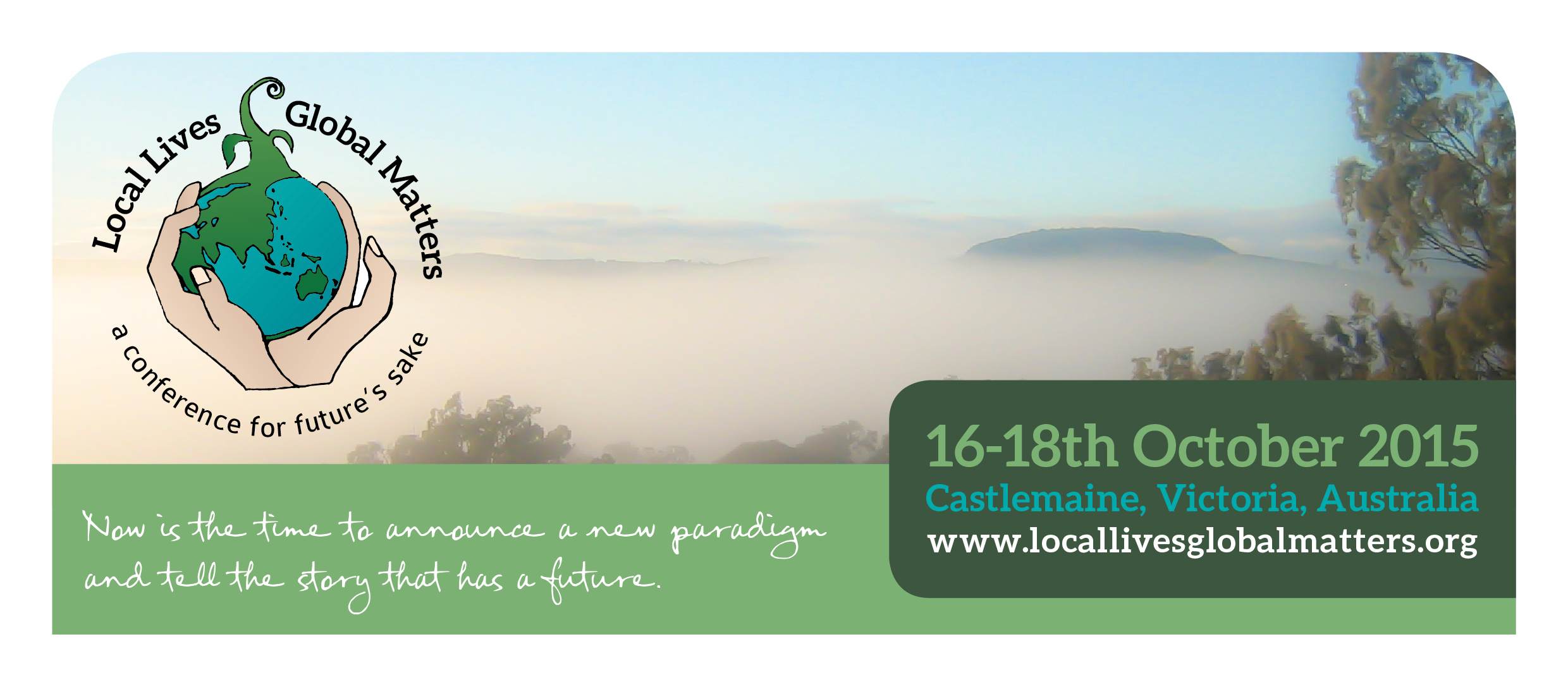
Outside the Castlemaine Town Hall crowds begin to gather. I walk towards the entrance, each footfall in rhythm with the thrum of a didgeridoo, a sound I always imagine as earth’s voice, or one of them at least; a kind of reverberation from what Martin Shaw describes as this ‘huge dreaming animal’ we call earth. Next to the didge player, Uncle Rick places eucalypt and other indigenous leaves, one by one, into a simple iron hearth, transmuting flame into smoke. He gestures for us to participate; he invites our bodies, our spirits, to be touched by smoke, to be cleansed; he calls us to get smoke under the soles of our feet, those sites of learning; the soles of our feet that connect us to this earth.
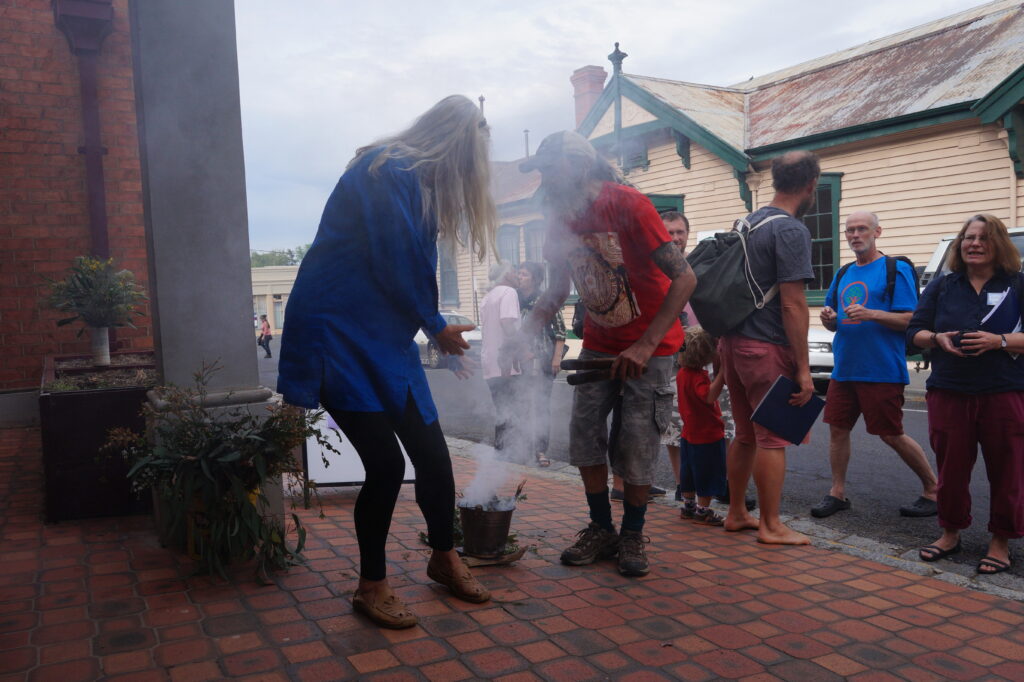
Ten years ago, a group of us living in central Victoria, supported by Local Futures, Borderlands Cooperative and Oases Graduate School, hosted Local Lives Global Matters- a Conference for Future’s Sake. Reflecting back on those three days and three nights it’s as though we created an alive multi-dimensional map, each presentation a story, emerging like a feature in the landscape. Each story, whether birthed in Castlemaine, Gippsland, India, rural Tasmania, Daylesford, Brazil or some other part of our globe, connecting with others, giving form and depth to an emerging picture. Each and every story criss-crossing the topography like indigenous Songlines, knowledge caretakers, communicating how we navigate through this terrain, showing what we might encounter at each site, informing our obligations, as Bundjalung elder Rhoda Roberts invites, ‘to look after all we travel through’.
On Monday September 1st, 2025, Localising Leanganook hosted a community conversation reflecting back on the Local Lives Global Matters conference, in and around Castlemaine, 10 years earlier, in October 2015. This Ten Years On Community Conversation was held as a Castlemaine Free University event, ably facilitated by Newstead’s Sharon Frazer and Castlemaine’s Lexi Randall-L’Estrange. As one of the conference organising team, I shared brief reflections on how the conference came about, the conference themes, some outcomes, and finished with thoughts from Rob Hopkins and the Transitions Towns movement.
How did conference come about?
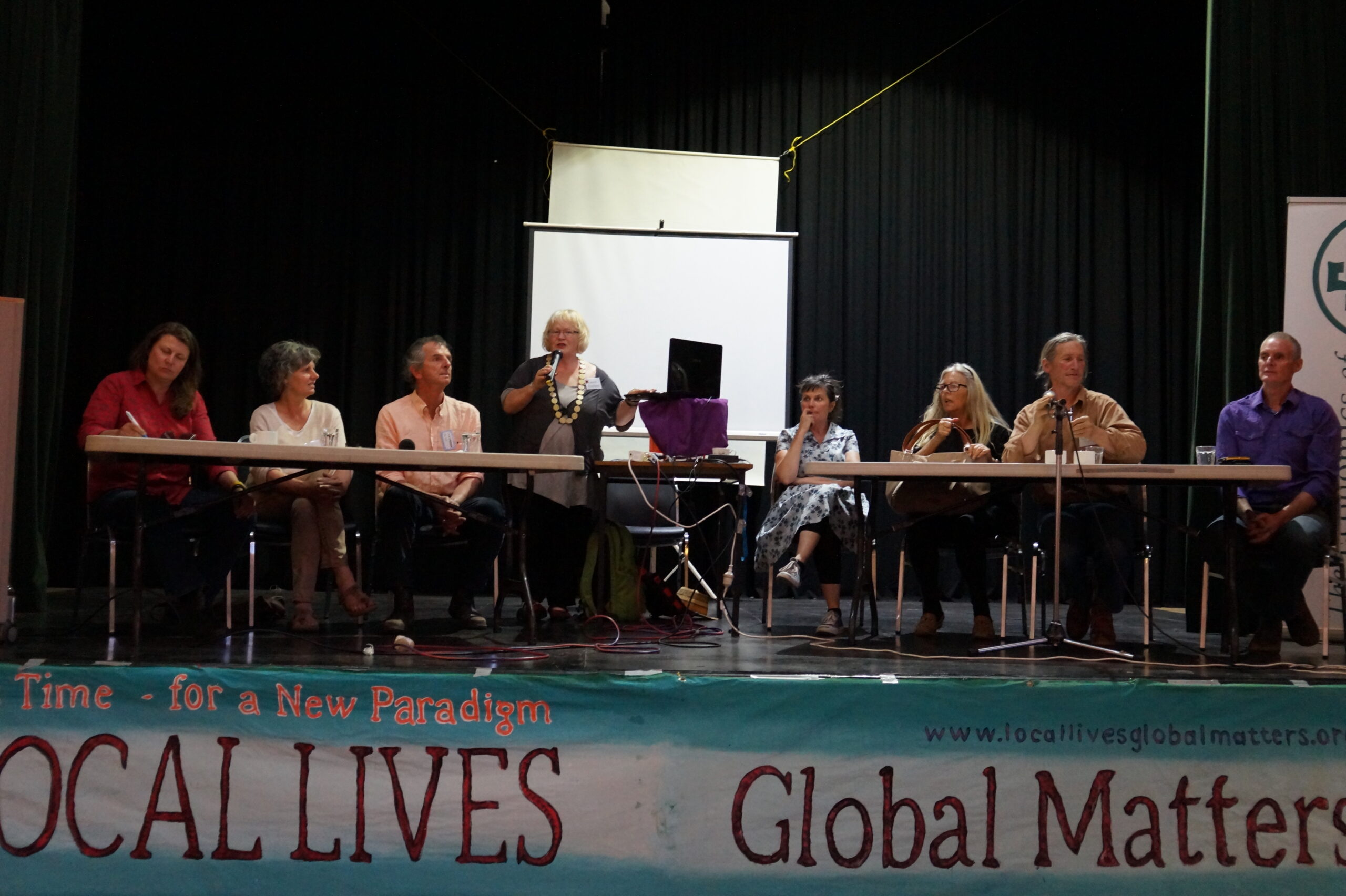
Now is the time to announce a new paradigm and tell the story that has a future– that was conference opener and the invitation on all publicity –a recognition of the crisis generated by the intersection of capitalism, colonialism, globalisation and patriarchy, and a call for localisation. The Conference Vision was articulated as:
‘The Great Transition’ to creating a truly sustainable relationship between humanity and nature must take place in the current generation. Biodiversity loss and climate catastrophe are inevitable consequences of our current social and economic systems and both are close to critical tipping points. The never-ending quest for corporate profits drives ever increasing resource use and the degradation of the natural world on which we all depend. Our global trade regimes prioritise the interests of corporations over people and nature and are symbolic of our upside down values. Political decision making has been captured by corporate interests, eroding democracy and creating political apathy.
The conference focused on local communities all around the world creating a better future: strengthening relationships between people, land and integrated systems. Local Lives Global Matters built on what was already happening by fostering thriving, local and regional economies and societies and accelerating the transition to a world without fossil fuel and growth addictions.
A group of active locals from Mt Alexander and Hepburn shire (including Carolyn, Ellen, Bernie, Laurel, Ben, Charlie, Alexandro, and supported by Jacques from Borderlands and OASES Graduate School, and by Helena Norberg-Hodge from Local Futures ) took 12 months to prepare, with regular meetings at Ellen’s house, at Myrnong becoming ‘conference central’. A team of volunteers were also recruited.
There was a sense of ‘it’s time’- to show-case creative localising initiatives and thinking across central Vic and to connect with global, national and regional initiatives and thinking. There was also recognition that Central Vic is a hub for localisation, innovation, forward thinking, especially Castlemaine and Daylesford, but also including Bendigo city and Macedon Ranges shire.
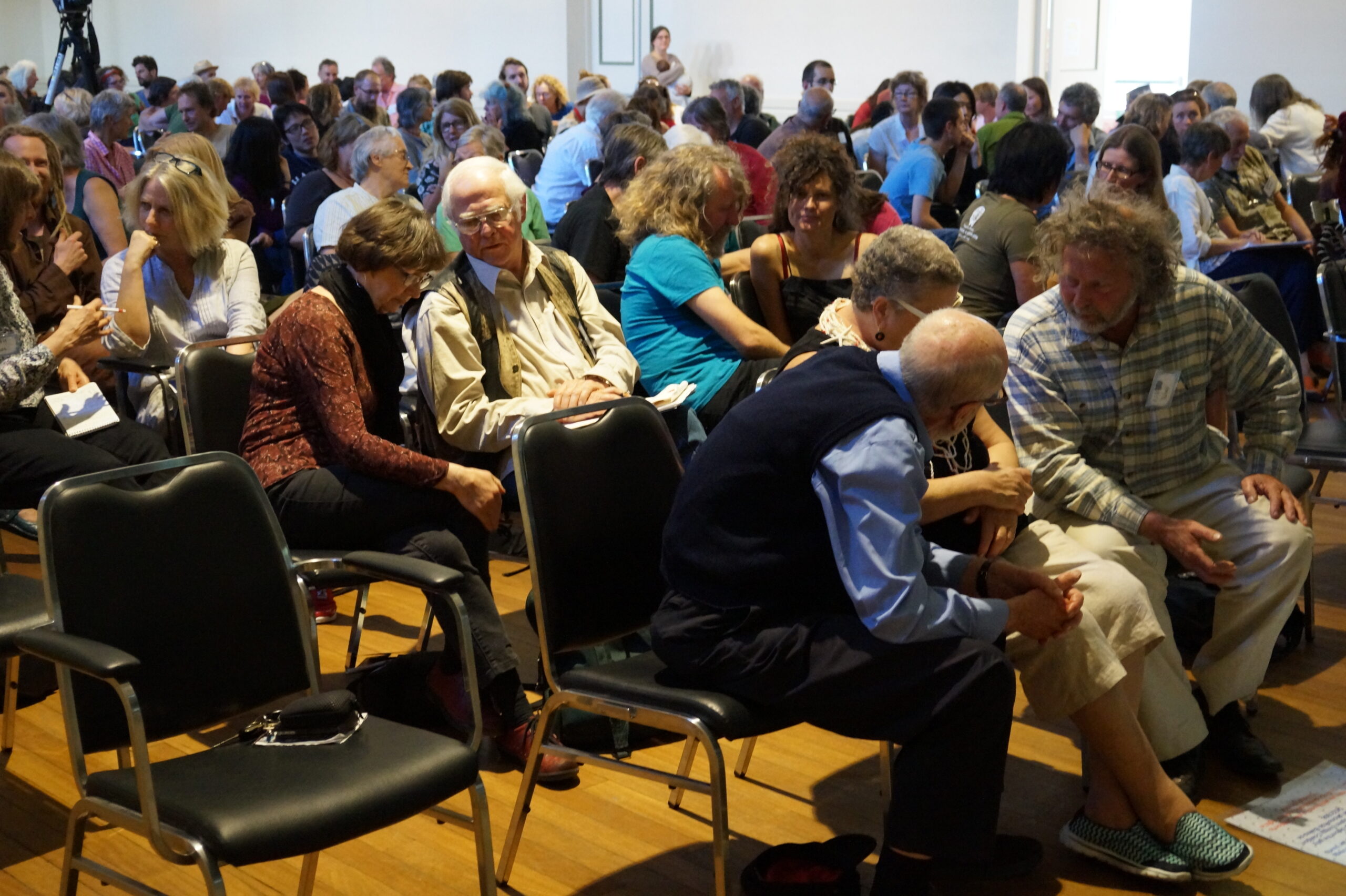
Some core principles for the conference organising group included: acknowledging the activism and creativity of this region by ensuring our local people ‘shared the stage’ with international presenters in all sessions, encouraging cross-fertilisation with other parts of Australia and around the world. We were committed to local procurement, for example Green Graphics for publicity material, Growing Abundance and Murnong Mamma’s for food. We worked in partnership with others eg Local Futures (Economics of Happiness), Borderlands Coop, as well as local residents especially within Hepburn and Mt Alexander shires.
Gifting was foundational to conference organisation and presentations. Everyone gifted their time. Local venues and publicity were provided at a subsidised rate. International guests had airfares paid for, plus food and accommodation, but otherwise gifted their time, knowledge and insights etc. Local philanthropy, participant registrations, plus support from Local Futures, covered all other costs.
The conference included a variety of formats such as presentations, workshops, panel discussions, plenaries, story-telling, arts, music, film, dance and site visits, all of which showcased local initiatives and helped initiate new ones. Most presentations were face to face, however some international guests, like Rob Hopkins from the Transition Towns movement, spoke via video link.
While Local Lives Global Matters cannot take credit for new initiatives that have emerged in the past 10 years relating to the four conference themes, the conference did create a sense of possibility, of seeding, of inspiration, and of interconnection with other initiatives locally and globally. In giving voice to this emergent sense-making, activism and practical localised responses, conference presentations felt like ‘tuning-in’ to a kind of ‘band-width’, listening to a broadcast minus the distracting ‘static’, otherwise present in so much of our everyday dis-information.
Conference Themes
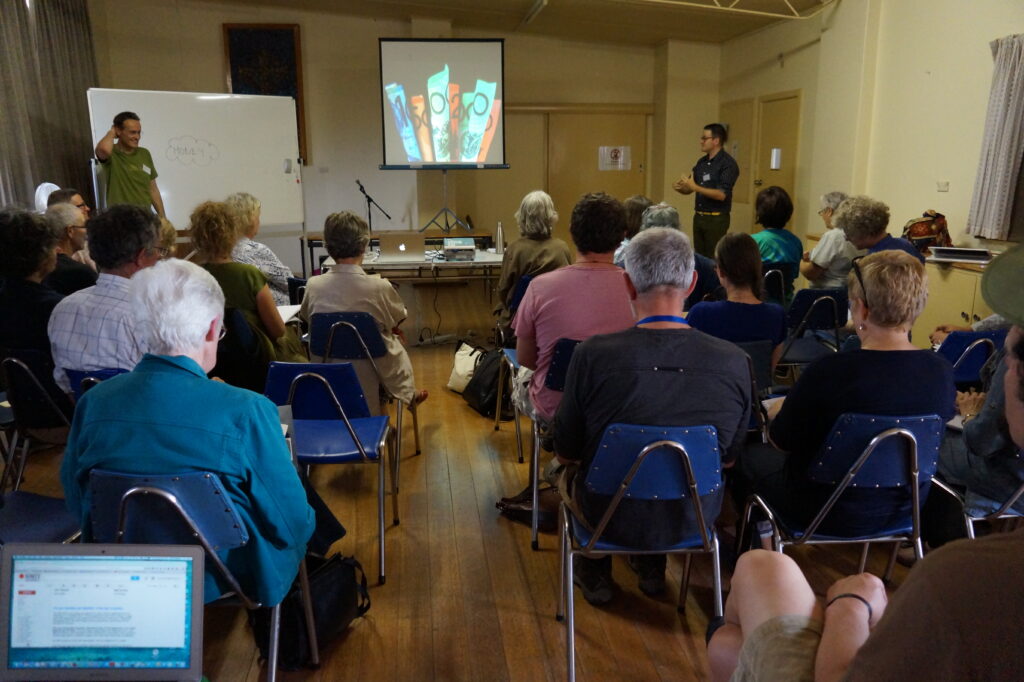
The Conference adopted four themes: Sustaining viable local economies; Reclaiming democracy; Acting on social and ecological justice; and Revitalising spirit and relationships. The themes cut across a variety of issue groupings such as housing, spirit, finance/trade, caring systems/health, work, education, food, recreation, arts and culture.
It’s not possible here to include all of the nearly 80 presentations offered during those three days and nights. However here are a few examples relevant to each of the themes.
Sustaining Viable Local Economies: Local Futures founder, Helena Norberg-Hodge, opened the conference, highlighting the impact of globalisation on local communities and articulating foundations for localisation. Castlemaine’s Warwick Smith presented on the moral underpinnings of economics. From France, Raphael Souchier presented on food growing and sustainable local economies in Europe, in conversation with Castlemaine’s Anitra Nelson, bringing a post-capitalist and non-monetary perspective to economics. These presentations were further complemented by local groups such as Growing Abundance, with their focus on low food miles, and Harcourt Organics on family farming.
Acting on Social and Ecological Justice: This theme brought together Camila Moreno from Brazil, with her analysis of international climate change and negotiations, coupled with Castlemaine climate activists speaking about the divestment campaign. Daylesford’s David Holmgren, environmental designer, ecological educator and one of the co-originators of permaculture, explored a futuristic scenario. Castlemaine’s Joel Meadows demonstrated localised renewable energy, and in The Art of Permaculture Travel, Daylesford’s Patrick Jones and Meg Ulman shared stories of their epic cycling journey as a family, from Daylesford to Cape York.
Reclaiming Democracy: A presentation by Castlemaine’s Cam Walker (Campaign Coordinator with Friends of the Earth), entitled Democracy from the Ground Up was complemented by Newstead and Trentham’s community planning initiatives, including the development of Renewable Newstead.
Revitalising Spirit and Relationships: Australia’s Susan Murphy spoke about her latest book- Minding the Earth, Mending the World, intersecting Zen Buddhism with ecology. Dja Dja Wurrung elder, Uncle Rick Nelson, along with other local panel members, spoke about Culture Shift: Living and Working on Aboriginal Land. Un-schooling advocate, Manish Jain from Swaraj University in India, was joined in conversation by alternative educationalists, including Daylesford’s Dharma school. Castlemaine’s Rights of Passage presented on their contemporary, community-based rites of passage process, empowering young and old in this localised program; and alternative housing initiatives, both local and overseas, including Castlemaine’s Murnong community, shared their experience of ethics and practicalities, as well as joys and challenges.
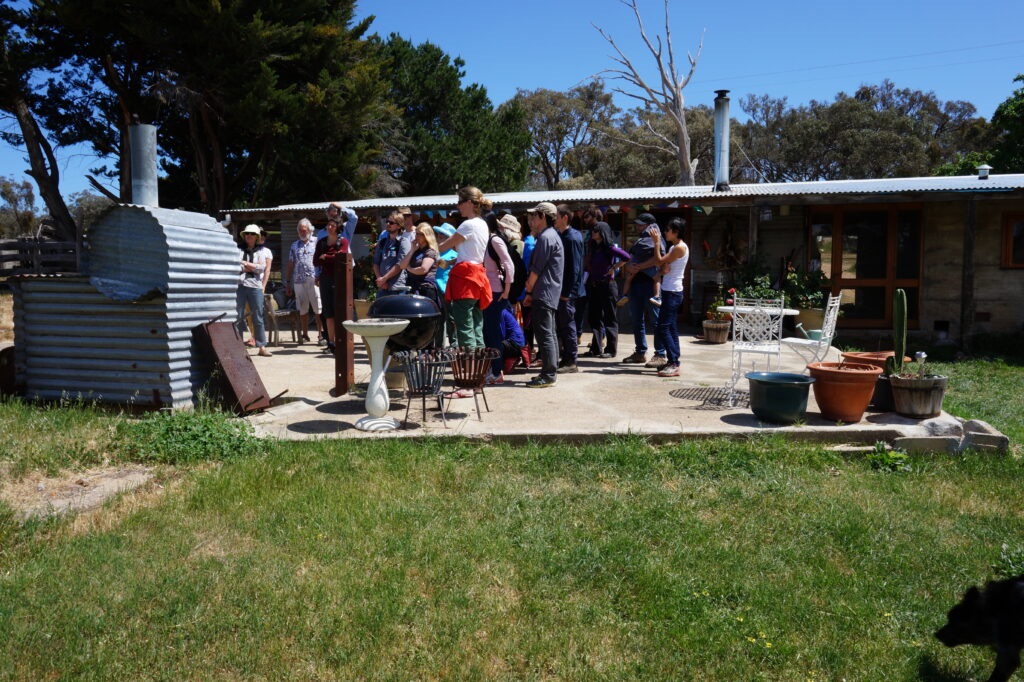
Site visits were also part of the conference program, including to Newstead Natives, to permaculture farms and to Hepburn Wind.
Emergent Activities and Programs over the past 10 years
It is heartening to witness some of the emergent localising activities across central Victoria during the ten years since the conference. Here are a few examples relevant to each of the themes:
Sustaining Viable Local Economies: Harcourt Organic Farming Coop; weekly farmers market; local small scale Abattoir in Eganstown; Wellbeing Economy- a Castlemaine Institute initiative; Degrowth Central Victoria.
Acting on Social and Ecological Justice: Nalderun crowd funding to protect Me-Mandook Galk – grandmother tree; Housing- My Home Network, Tiny homes on wheels planning regulation changes; Castlemaine Free University; Castlemaine Commons on-line sessions during covid lockdowns; expanded permaculture courses; Central Vic Climate Action; Yes In My Back Yard (YIMBY) community composting; Repair Cafes established in Castlemaine, Daylesford, Bendigo, Ballarat, Creswick and more.
Reclaiming Democracy: Democracy 4 Dinner; Really Local– deliberative democracy; Student Strike for Climate – Castlemaine as initiator; Voices for Indi sessions; Community Voice – democratic renewal in Hepburn shire, including a charter of participatory democracy; How can we do democracy better? forum.
Revitalising spirit and relationships: Local Lives Global Matters (# 2) scheduled for 2020 and cancelled due to Covid) included a grief and gratitude ritual; Various groups connected to the sacred and the spirit including Castlemaine Zen, Quakers, Johannine community, Yandoit Sacred/Yandoit Cultural church in community hands, Sipwell; Forest and Free bush school (Daylesford); Nalderun- indigenous world views sessions.
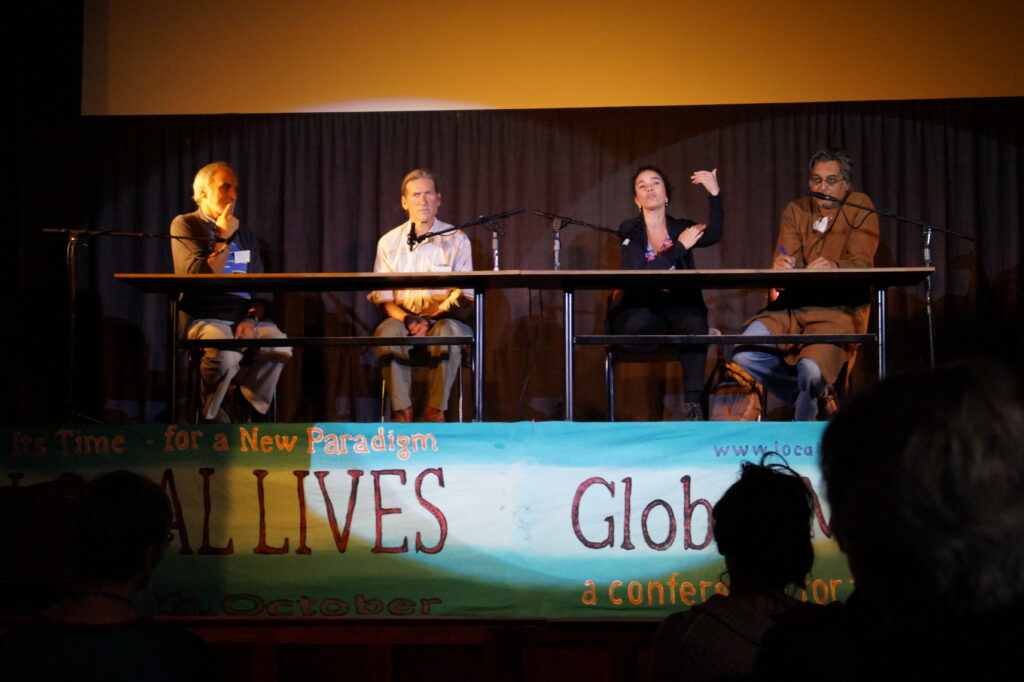
In addition, Localising Leanganook has organised numerous community conversations, prepared a regular e-news show-casing and encouraging groups, thinking and events with a localising focus, across all conference themes.
In closing, I draw inspiration from a few local conference participants, and also from Susan Murphy and Rob Hopkins, both of whom presented at the conference . Here’s comments from a few who attended:
- ‘What really came out for me was the importance of doing things locally- the local connections, strengthening community; also the connection to land and agriculture came through time and time again’.
- ‘The international stuff was really useful in informing the local. I’m taking this whole notion of re-educating ourselves and our kids more seriously, rather than letting that responsibility go to schools and institutions.’
- ‘I’ve never been in a room full of people in the community where everyone was inspired and all came together – learning about bringing meaning back into things, bringing story back into our lives, sharing knowledge though story, and bringing ritual and celebration…when you’re disconnected from community and complicating your life with stuff, you miss out on what’s truly valuable.’
- ‘I feel like I’m on the right track with what I’m doing now…I love the way the presentations tied in the global issues with local small scale solutions, which can make a big difference, instead of feeling depressed and wondering what I can do to help out’.
Zen Buddhist and writer Susan Murphy described the three days as: ‘a beautifully alive and interconnected mandala of local and global events, speakers, panel presentations, food and evident community that fitted the title- Local Lives Global Matters- so completely. The local community brought so much to meet the global speakers and it was a beautiful thing to slow sync into that’.
Rob Hopkins spoke via video link at the conference, with a focus on the Transition Towns movement, in particular Totnes in the UK where he lives. In his book, written after the conference: From What Is to What If- Unleashing the Power of Imagination to Create the Future We Want, Hopkins calls us to reclaim and unleash our collective imagination and put our energy and determination towards making a better world a reality. He invites us to ask better questions: “We need to master the art of asking questions which address the gravity of our situation, yet which also create longing, which evoke a deep and rich sense of the wonders we can still create”. Hopkins reminds us that we humans are story telling creatures- we tell stories to shape our sense of the world. So, becoming better story tellers is essential. It is through story that new possibilities are unlocked and from narrative comes the power for social change. “We need to make intentional spaces for people to tell, share or co-create these stories, spaces that are well facilitated and feel safe and inviting. Our stories need to try to speak to our deep memories, our bone memory, the things that fundamentally move and touch people, that really resonate. They need to make use of foreshadowing. And most important of all, we need to tell them as often as we can”.
That’s what we tried and, I think, succeeded in doing throughout Local Lives Global Matters, integrating Hopkins’ trinity of skills: unleashing our imaginations; asking better questions; and becoming better story tellers- all valuable tools as we continue to create transformational change so needed at this time.
………………………
Local Lives, Global Matters, 10 Years on Conversation- A Summary
Global matters evidenced, what has/is happening towards localisation, plus Calls to Action.
With thanks to Sharon Frazer, Lexi Randall- L’Estrange, Carolyn Neilsen and Bernie Tonkin
| Theme | What is being evidenced |
| Democracy | Corruption of democracy
Power of binaries reducing commons Rise of racism Racism being weaponised Active work to find common ground Wars Centralised decision making Lobbying is overwhelming us Need to get more focused apart from demonstration on issues |
| Social ecological justice | Populations: enough food, not everyone has food security
Housing We are witnessing the crumbling of the ‘old order’. It’s the darkest time before the dawn Evolution of young people being mutually supportive |
| Economic | Care economy undervalued- decentralised, devalued, decentred
Size of houses is crazy Economy wants 2 person households, atomising society, too much pressure Deregulation of the finance sector Widening gap between rich and poor Wellbeing economy Why can’t government be more public |
| Spirit, relationships | Us and them thinking-loss of trust in each other and the system is polarising
Challenged on how to connect across the divide Work to find common ground- deescalating and softening conflict The blatant strategy of division |
| Cross-cutting | Housing
Local food production Energy independent Connection to nature-rewilding Neo-Naziism is systemic Food security can be a reality Climate 2050- realism of action on this needed not performativity, greenwashing around Paris goals Energy transformation Energy and water Media- not real, violence on TV |
Local Lives Global Matters Themes
| Theme | What has happened/is happening | Calls to action |
| Revitalising Spirit and relationships | Programs for First Nations youth trips on Country
Steiner School recognition Black Lives Matter statement recognition Rites of passage movement Food relief program Uncle Rick’s Tours Community Conversations Better use of print media to communicate especially about linking-up Community Lunch Castlemaine Get connected program-Community House Sprouts soup kitchen Reconciliation week activities Indigenous world view work-Yapeen |
Provision in area to have camps and sleepouts
Shifting Shifting away from ‘separation thinking’ to recognition that things are interconnected Big notice board Setting up functions sheet that has a point Community of gathering Increased self reflections Spirit Community of practice around spirit and relationships |
| Reclaiming Democracy | No collective truth
Democracy for dinner Localising democracy |
Honesty in political campaigns
Truth in politics Youth engagement Individual responsibility Understanding where we give our power away Build on local democracy movement |
| Sustaining viable local economies | MALETS lack of support from local council eg denied access to old information centre
Financial starvation of key institutions due to changing government priorities Lack of funding health and schools Castlemaine Co-op MASG retrofitting leading to local employment and training, more affordable to live. Whole of home resilience project Castlemaine Institute Wellbeing economy work by the Castlemaine Institute MASC economic development strategy based on wellbeing economy Degrowth movement locally |
Pay taxes direct to local charities and offset
Support alternative economies eg MALETS Degrowth options for young people- don’t join the rat-race Financial literacy for the young Moving the wellbeing economy forward 2 parents working full-time, used to be part-time. Leads to less involvement in the community therefore create alternative to this Increase affordable housing Castlemaine co-op. People pooling their super to invest in local assets Clean energy Local currency for Castlemaine |
| Acting on social and ecological justice | Climate action
Connect with Country and nature Farmers market Food security alliance Inclusion: Indigenous, gender, LGBTQ+, refugees Nalduran bush tucker Tiny homes First Nations scholarship groups My Home Network Residential housing communities Local democracy YIMBY Erosion of democracy creating the need for us to speak out Climate action-absence of government Safe Space Castlemaine Community Co-operative Landcare connecting community through nature Older Women in Co-Housing (WINC) Rural Australians for Refugees (RAR) Degrowth Reconciliation Aboriginal and Torres Strait Islander self determination Support of Treaty First Nations Solidarity Group Mount Alexander Disability Advocacy Group Castlemaine Climate Collective |
Support to local high school
Support for young people who are in despair Support for crowd funding for housing older women Antiracism Support for development of land for housing that is inclusive of nature Build on current action
|
Calls to Action- a Follow-up Session to Local Lives Global Matters 10 Years On Community Conversation
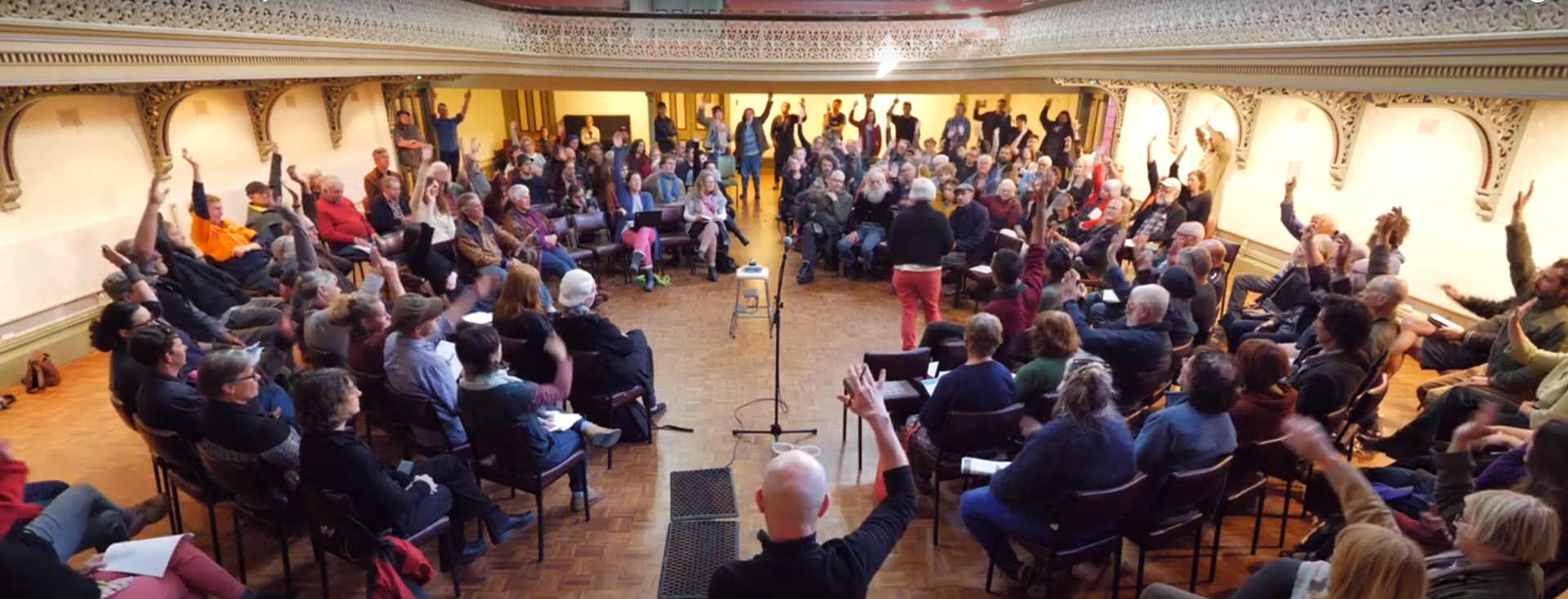
Localising Leanganook is hosting a follow up session to further explore some of the calls to action identified in the 10 Years On Community Conversation held in September .
This follow up session is scheduled for : Monday October 27th, 6.00pm at Northern Arts Hotel, Barkers St, Castlemaine. All welcome.
Degrowth Central Victoria
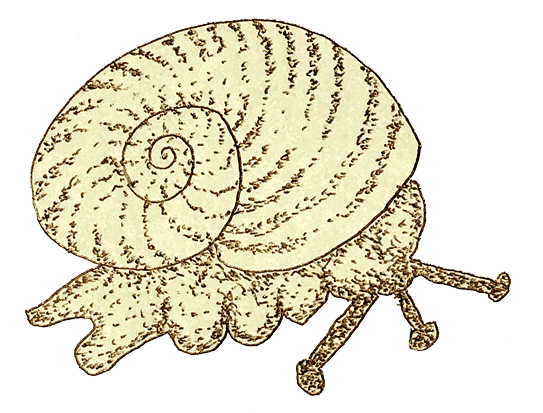
E-newsletter : This is published with details of our activities, such as Castlemaine Free University events and Substack posts as well as an invite to our next Degrowth Central Victoria (DCV) meeting. If you like to read and/or be on the mailing list, contact degrowthcentralvic@proton.me
Degrowth Reading Group: is meeting for one hour (or so) fortnightly at the Northern Arts Hotel on Wednesdays at 6 pm. The group is self-organising with one member introducing the pre-selected reading and facilitating discussion. All are welcome, including irregular attendees.
Castlemaine Community House Short Introductory and Advanced Degrowth Courses: Castlemaine Community House (CCH) hosted a pilot Introductory Degrowth Course with five 90-minute weekly sessions 5 February to 5 March 2025. This free course was oversubscribed, well-attended, and spawned a self-organising group of participants taking these ideas further.This introductory course ran again within the CCH funded programs 25 August to 22 September 2025 with a small fee for participants. It will run in 2026 in response to demand.
An advanced course will be hosted by the CCH in 2026 too. It comprises six fortnightly sessions of 90 mins with participants focussed on practical degrowth projects with a local presentation. In the first week participants identify a project they will realise through the course, either as an individual, twosome or bigger group. This is an opportunity to explore a personal/group passion or challenge. To express an interest in booking and for further details, please email CCH (reception@cch.org.au) and or DCV – degrowthcentralvic@proton.me
Substack: Our DCV Substack has regular posts on degrowth every two-three weeks.To receive alerts, join as a free subscriber –https://degrowthcentralvictoria.substack.com/ We welcome ideas and submissions for posts — degrowthcentralvic@proton.me
Planning activities for 2026: You are invited to our next DCV meeting where we report on past activities and discuss proposals for new ones, delegating efforts and pre-planning. The meeting will take place as a Castlemaine Free University event on the first Monday in November, 3 November at Northern Arts Hotel 6–7 pm.
For more information on Degrowth Central Victoria — https://degrowthcentralvic.org/
Castlemaine Free University
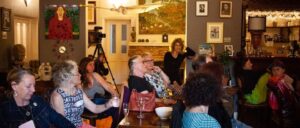
Our last Castlemaine Free University event for 2025 will take place 6–7.30pm on Monday 1 December with a film and more.
Castlemaine Free University (2021–) started before DCV but is now an activity within and of DCV. So we are amalgamating our formally separate e-lists for both CFU and DCV. Let us know if you wish to unsubscribe — degrowthcentralvic@proton.me
For more details contact — degrowthcentralvic@proton.me
Nobody Beats Dan Murphy’s?? The Daylesford Community does!
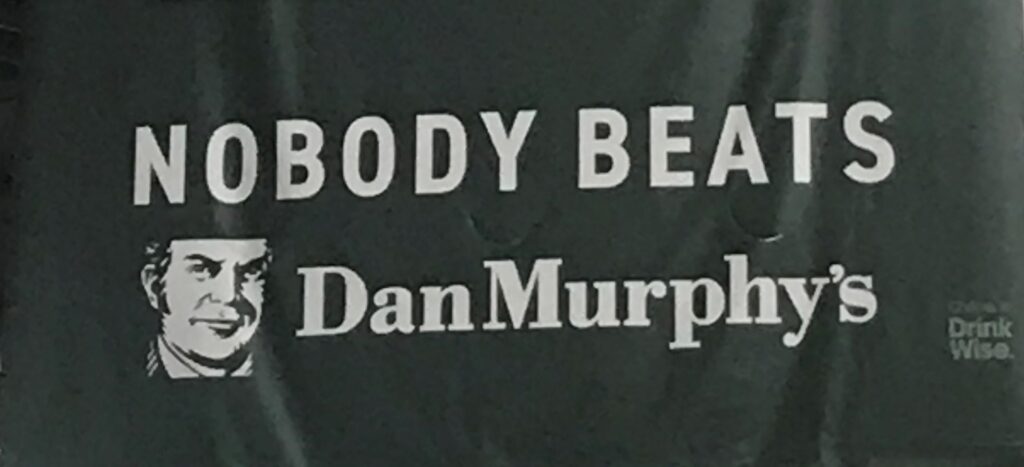
Australia’s largest retail drinks network has been knocked back for a second time in its legal bid to open a liquor store in the regional Victorian town of Daylesford. After more than three years of heated contention from a group of residents, it may be the end of the line for the company behind the proposed Dan Murphy’s liquor store.
The Victorian Liquor Commission in July 2022 refused the licence on the grounds it “would be conducive or encourage harm, specifically to minors”.
Former Hepburn Shire councillor Jen Bray, who was part of the community resistance to the Dan Murphy’s store, told ABC Ballarat Breakfast Radio she was elated about the second win.
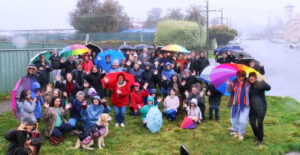
“It’s pretty miraculous that a small community like Daylesford can have a win against a huge corporate giant.” “This only happens in the movies.” Ms Bray said the proposed store had always been in the wrong spot. “It’s right opposite a kindergarten, a primary school, a swimming pool and a bus stop,” she said. “It’s just not appropriate to have a liquor store right there.”
In its reasons, the tribunal said it had been “well over a decade since VCAT has had to review a liquor licence”. The tribunal said it agreed with the commission that if the Dan Murphy’s store had gone ahead, a 40 per cent increase in the sale of alcohol would be “a significant increase” for the town. “Put simply, we have decided not to grant the liquor licence because of particular local, social, demographic and geographic circumstances,” the tribunal said in its reasons. “The premises is located in an education and family-friendly area, with children of all ages present throughout the year.”
(from ABC News, October 1st, 2025: https://www.abc.net.au/news/2025-10-01/daylesford-celebrates-liquor-store-knockback/105837910)
Community Climate Collective
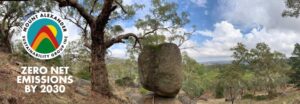
Hepburn’s Swiss Italian Festa
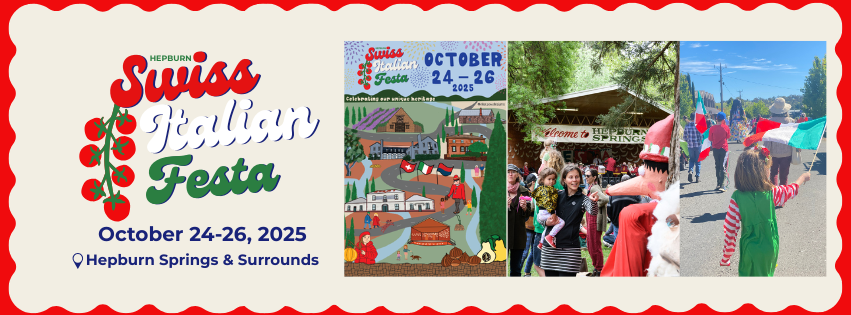
This coming weekend, from Friday 24th until Sunday 26th October, is a celebration of culture, heritage and community honouring the Swiss and Italian migrants whose spirit continues to shape life in and around Hepburn shire.
For more information about whats on: https://www.swissitalianfesta.com/
Yandoit Hills Stone Houses Tour
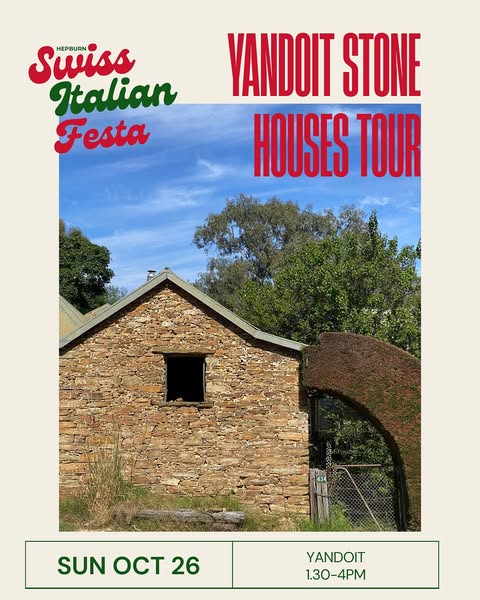
The stone houses tour is one of many Swiss Italian Festa events.
Built by Swiss and Italian immigrants who settled in the region during the 1860s gold rush, these beautifully preserved homes tell the story of resilience, craftsmanship and community spirit. Join us to walk through history — and step straight into classic Italy, nestled in the heart of Yandoit.
A special guided tour with Yandoit Cultural.
For more information and bookings: https://www.swissitalianfesta.com/program/yandoitstonehousetour
Daylesford Community Cinema – The Phoenix
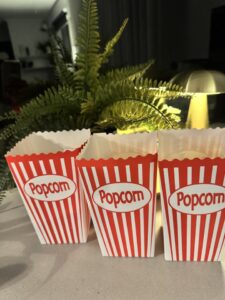
At Phoenix @ The Rex, our vision is to revive the cinematic experience in Daylesford by providing a community-owned and operated theatre that offers more than just films. A candy bar selling popcorn, wine, choc tops in beautiful art deco surroundings.
The move to bring the magic of cinema back to Daylesford has attracted a team of talented locals. These passionate individuals work tirelessly behind the scenes, promoting our vision, overseeing construction, and spearheading fundraising efforts.
For more information: https://www.daylesfordcinema.org.au/
Really Local and Deliberative Democracy

Want to help build our citizens assembly? Have you got an interest or time or skills to contribute? Let us know. We welcome new members or offers of help to our Working Group.
Helpful skills and supports include: governance, community engagement and process design, communications (social media, newsletter writing, film, stories, vox pops), funding submission writing, finances and acquittal.
Get in touch: connect@reallylocal.au
Mt Alexander Community Land Trust (MACLL)
Renewed Energy for Australia’s oldest CLT
MACLL, formed in 2009, holds the distinction of being Australia’s oldest Community Land Trust entity, a quiet pioneer in the movement for permanently affordable housing.
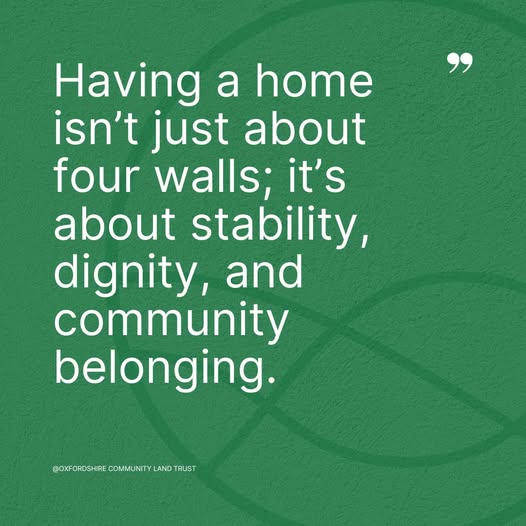
The land trust aims to provide perpetually affordable housing for people on low incomes who live or work in the Mount Alexander Shire who cannot access either long term affordable home ownership or a secure rented property through channels that currently exist. Also, to promote equal access to high quality and well designed housing that is both environmentally sound and in keeping with community expectations.
With land prices in Victoria beginning to moderate, opportunities for acquiring sites are improving. The MACLL team is actively evaluating several parcels of land to advance their mission: providing perpetually affordable, well-designed, and environmentally sound housing for people on low incomes who live or work in Mount Alexander Shire, people who are too often priced out of secure housing through existing market channels.
Maldon Heritage Network
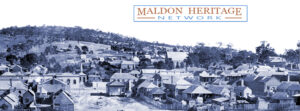
Maldon Heritage Network is hosting a presentation by the Mount Alexander Shire Council on heritage planning.
97 High Street, Maldon (rear of the Athenaeum Library)
Enquiries: maldonheritagenetwork@proton.me

![[ Random Image ]](https://leanganook.org/images/image_11.jpeg)